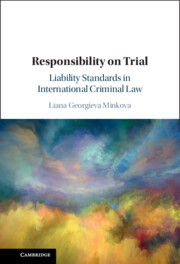Book contents
- Responsibility on Trial
- Responsibility on Trial
- Copyright page
- Dedication
- Contents
- Acknowledgements
- Abbreviations
- 1 Introduction
- 2 The International Legal Field
- 3 The International Criminal Justice Field from Within
- 4 Before Rome
- 5 Drafting the Rome Statute
- 6 Interpreting the Rome Statute
- 7 An Overview of ICC Cases
- 8 The Road to Acquittals
- 9 The Road to Convictions
- 10 Concluding Remarks
- Bibliography
- Index
1 - Introduction
International Criminal Law between Legalism and Critique
Published online by Cambridge University Press: 09 February 2023
- Responsibility on Trial
- Responsibility on Trial
- Copyright page
- Dedication
- Contents
- Acknowledgements
- Abbreviations
- 1 Introduction
- 2 The International Legal Field
- 3 The International Criminal Justice Field from Within
- 4 Before Rome
- 5 Drafting the Rome Statute
- 6 Interpreting the Rome Statute
- 7 An Overview of ICC Cases
- 8 The Road to Acquittals
- 9 The Road to Convictions
- 10 Concluding Remarks
- Bibliography
- Index
Summary
Chapter 1 situates Responsibility on Trial within the existing interdisciplinary literature on international criminal justice and presents the research aims of the book. Chapter 1 highlights a gap in the existing literature: international criminal law norms are generally treated either as objective and static standards that are independent from states’ political interests (the ‘liberal-legalist’ thesis), or, conversely, as inevitably indeterminate concepts that enable the perpetuation of global structural inequalities (the ‘critical’ thesis). While both perspectives provide important insights into the operation of international criminal justice, they fail to examine the dynamic nature of legal norms as vehicles for both continuity and change in the field and the implications of those dynamics for the assessment of individual criminal responsibility for mass atrocities. To address this gap, Chapter 1 borrows insights from the work of Shklar and Kirchheimer and proposes building an ‘intersubjective’ framework of analysis that recognizes law’s inherent normativity not as an objective fact but as a form of social practice.
Keywords
- Type
- Chapter
- Information
- Responsibility on TrialLiability Standards in International Criminal Law, pp. 1 - 32Publisher: Cambridge University PressPrint publication year: 2023
- 1
- Cited by

